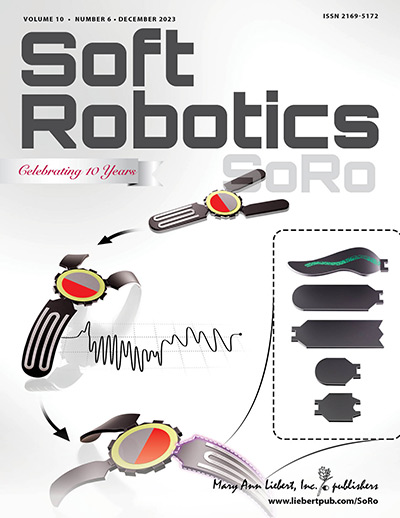基于模型的分布式应变传感软机器人三维形状重构。
IF 6.1
2区 计算机科学
Q1 ROBOTICS
引用次数: 0
摘要
软体机器人的本体感觉对于实现自主行为至关重要,使它们能够在非结构化环境中安全地导航和交互。以前基于传感器的形状重建方法通常依赖于机器学习技术,在不同机器人系统和环境的广泛适用性方面存在局限性。在这项工作中,我们提出了一种由软机器人表面稀疏分布的软应变传感器实现的形状重建方案,并结合了基于模型的重建框架。我们的方法利用具有大拉伸性和低迟滞的小型化可拉伸电容应变传感器,可以很容易地连接到柔软的机器人表面进行精确的局部应变测量。这些测量结果被输入到一个带有嵌入式机械约束的优化算法中。该方法可以预测软杆的所有变形模式,最大位移误差小于杆长的4%,并能准确地重建软气动夹具在抓取过程中的形状。在复杂的接触场景中,生物仿生手臂的额外重建进一步证明了我们方法的多功能性。这种基于分布式应变传感器的形状重建方案为增强软体机器人本体感觉提供了一种方便且广泛适用的解决方案。本文章由计算机程序翻译,如有差异,请以英文原文为准。
Model-Based 3D Shape Reconstruction of Soft Robots via Distributed Strain Sensing.
Proprioception in soft robots is essential for enabling autonomous behaviors, allowing them to navigate and interact safely in unstructured environments. Previous sensorization-based shape reconstruction methods, which often rely on machine learning techniques, have limitations in their broad applicability for different robotic systems and environments. In this work, we present a shape reconstruction scheme enabled by sparsely distributed soft strain sensors on the surfaces of soft robots, combined with a model-based reconstruction framework. Our approach utilizes miniaturized stretchable capacitive strain sensors with large stretchability and low hysteresis, which can be easily attached to soft robot surfaces for accurate local strain measurements. These measurements are fed into an optimization algorithm with embedded mechanical constraints. Our approach can predict all deformation modes in a soft bar with a maximum displacement error of less than 4% of the bar length and accurately reconstruct the shapes of soft pneumatic grippers during grasping actions. Additional reconstructions of a bioinspired arm in complex contact scenarios further demonstrate the versatility of our approach. This shape reconstruction scheme using distributed strain sensors offers a convenient and broadly applicable solution for enhancing proprioception in soft robots.
求助全文
通过发布文献求助,成功后即可免费获取论文全文。
去求助
来源期刊

Soft Robotics
ROBOTICS-
CiteScore
15.50
自引率
5.10%
发文量
128
期刊介绍:
Soft Robotics (SoRo) stands as a premier robotics journal, showcasing top-tier, peer-reviewed research on the forefront of soft and deformable robotics. Encompassing flexible electronics, materials science, computer science, and biomechanics, it pioneers breakthroughs in robotic technology capable of safe interaction with living systems and navigating complex environments, natural or human-made.
With a multidisciplinary approach, SoRo integrates advancements in biomedical engineering, biomechanics, mathematical modeling, biopolymer chemistry, computer science, and tissue engineering, offering comprehensive insights into constructing adaptable devices that can undergo significant changes in shape and size. This transformative technology finds critical applications in surgery, assistive healthcare devices, emergency search and rescue, space instrument repair, mine detection, and beyond.
 求助内容:
求助内容: 应助结果提醒方式:
应助结果提醒方式:


